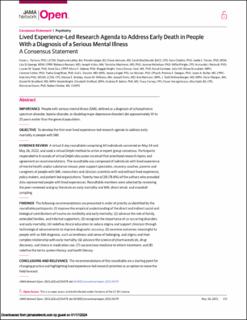| dc.contributor.author | Fortuna, Karen L. | |
| dc.contributor.author | Lebby, Stephanie | |
| dc.contributor.author | Geiger, Pamela | |
| dc.contributor.author | Johnson, Diane | |
| dc.contributor.author | MacDonald, Sandi | |
| dc.contributor.author | Chefetz, Ilana | |
| dc.contributor.author | Ferron, Joelle C. | |
| dc.contributor.author | St George, Lisa | |
| dc.contributor.author | Rossom, Rebecca | |
| dc.contributor.author | Kalisa, Joseph | |
| dc.contributor.author | Mestrovic, Tomislav | |
| dc.contributor.author | Nicholson, Joanne | |
| dc.contributor.author | Pringle, Willie | |
| dc.contributor.author | Rotondi, Armando J. | |
| dc.contributor.author | Sippel, Lauren M. | |
| dc.contributor.author | Sica, Amie | |
| dc.contributor.author | Solesio, Maria E. | |
| dc.contributor.author | Wright, Maggie | |
| dc.contributor.author | Zisman-Ilani, Yaara | |
| dc.contributor.author | Gambee, David | |
| dc.contributor.author | Hill, Julia | |
| dc.contributor.author | Brundrett, Alison | |
| dc.contributor.author | Cather, Corinne | |
| dc.contributor.author | Rhee, Taeho Greg | |
| dc.contributor.author | Daumit, Gail L. | |
| dc.contributor.author | Angel, Jessica | |
| dc.contributor.author | Manion, Ian | |
| dc.contributor.author | Deegan, Patricia E. | |
| dc.contributor.author | Butler, Jason A. | |
| dc.contributor.author | Pitts, Nakristia | |
| dc.contributor.author | Brodey, Denise E. | |
| dc.contributor.author | Williams, Aaron M. | |
| dc.contributor.author | Parks, Joseph | |
| dc.contributor.author | Reimann, Brie | |
| dc.contributor.author | Wahrenberger, J Todd | |
| dc.contributor.author | Morgan, Oscar | |
| dc.contributor.author | Bradford, Daniel W. | |
| dc.contributor.author | Bright, Nicole | |
| dc.contributor.author | Stafford, Elizabeth | |
| dc.contributor.author | Bohm, Andrew R. | |
| dc.contributor.author | Carney, Tracy | |
| dc.contributor.author | Haragirimana, Claver | |
| dc.contributor.author | Gold, Alisa | |
| dc.contributor.author | Storm, Marianne | |
| dc.contributor.author | Walker, Robert | |
| dc.date.accessioned | 2024-02-20T11:35:55Z | |
| dc.date.available | 2024-02-20T11:35:55Z | |
| dc.date.created | 2023-06-15T09:35:50Z | |
| dc.date.issued | 2023 | |
| dc.identifier.citation | Fortuna, K. L., Lebby, S., Geiger, P., Johnson, D., MacDonald, S., Chefetz, I., ... & Walker, R. (2023). Lived Experience–Led Research Agenda to Address Early Death in People With a Diagnosis of a Serious Mental Illness: A Consensus Statement. JAMA network open, 6(5), e2315479. | en_US |
| dc.identifier.issn | 2574-3805 | |
| dc.identifier.uri | https://hdl.handle.net/11250/3118637 | |
| dc.description.abstract | Importance People with serious mental illness (SMI), defined as a diagnosis of schizophrenia spectrum disorder, bipolar disorder, or disabling major depressive disorder) die approximately 10 to 25 years earlier than the general population.
Objective To develop the first-ever lived experience–led research agenda to address early mortality in people with SMI.
Evidence Review A virtual 2-day roundtable comprising 40 individuals convened on May 24 and May 26, 2022, and used a virtual Delphi method to arrive at expert group consensus. Participants responded to 6 rounds of virtual Delphi discussion via email that prioritized research topics and agreement on recommendations. The roundtable was composed of individuals with lived experience of mental health and/or substance misuse, peer support specialists, recovery coaches, parents and caregivers of people with SMI, researchers and clinician-scientists with and without lived experience, policy makers, and patient-led organizations. Twenty-two of 28 (78.6%) of the authors who provided data represented people with lived experiences. Roundtable members were selected by reviewing the peer-reviewed and gray literature on early mortality and SMI, direct email, and snowball sampling.
Findings The following recommendations are presented in order of priority as identified by the roundtable participants: (1) improve the empirical understanding of the direct and indirect social and biological contributions of trauma on morbidity and early mortality; (2) advance the role of family, extended families, and informal supporters; (3) recognize the importance of co-occurring disorders and early mortality; (4) redefine clinical education to reduce stigma and support clinicians through technological advancements to improve diagnostic accuracy; (5) examine outcomes meaningful to people with an SMI diagnosis, such as loneliness and sense of belonging, and stigma and their complex relationship with early mortality; (6) advance the science of pharmaceuticals, drug discovery, and choice in medication use; (7) use precision medicine to inform treatment; and (8) redefine the terms system literacy and health literacy.
Conclusions and Relevance The recommendations of this roundtable are a starting point for changing practice and highlighting lived experience–led research priorities as an option to move the field forward. | en_US |
| dc.language.iso | eng | en_US |
| dc.publisher | JAMA Network | en_US |
| dc.rights | Navngivelse 4.0 Internasjonal | * |
| dc.rights.uri | http://creativecommons.org/licenses/by/4.0/deed.no | * |
| dc.title | Lived Experience-Led Research Agenda to Address Early Death in People With a Diagnosis of a Serious Mental Illness: A Consensus Statement | en_US |
| dc.type | Peer reviewed | en_US |
| dc.type | Journal article | en_US |
| dc.description.version | publishedVersion | en_US |
| dc.rights.holder | The authors | en_US |
| dc.subject.nsi | VDP::Medisinske Fag: 700 | en_US |
| dc.source.volume | 6 | en_US |
| dc.source.journal | JAMA Network Open | en_US |
| dc.source.issue | 5 | en_US |
| dc.identifier.doi | 10.1001/jamanetworkopen.2023.15479 | |
| dc.identifier.cristin | 2154748 | |
| dc.source.articlenumber | e2315479 | en_US |
| cristin.ispublished | true | |
| cristin.fulltext | original | |
| cristin.qualitycode | 1 | |

